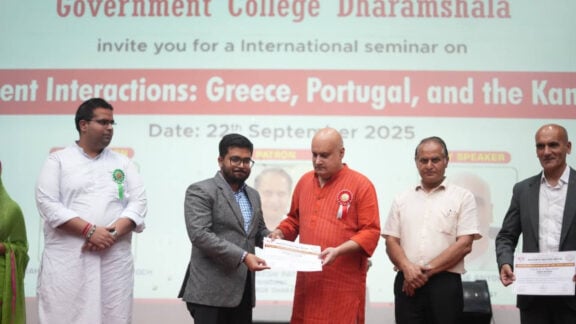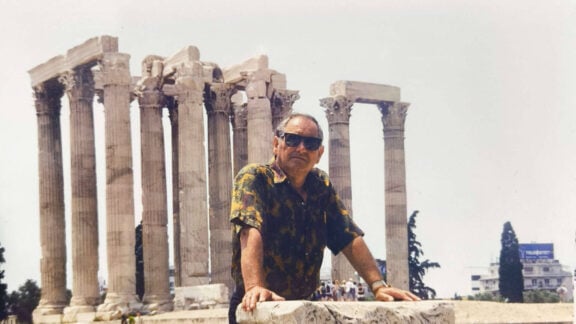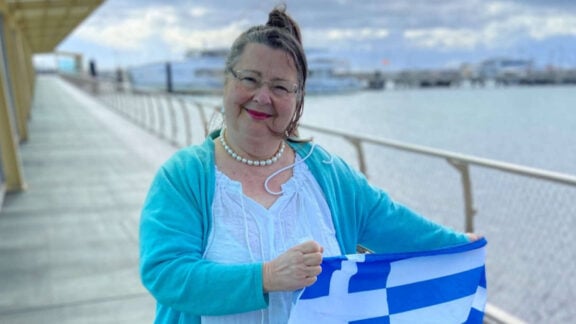The Monastery of Saint Porphyrius in southern Gaza, a historic Greek Orthodox sanctuary with a legacy dating back to the 4th century, had become a symbol of hope and unity in times of despair for both Palestinian Christians and Muslims, especially in recent years.
The monastery served as a sanctuary for those taking refuge from the Gaza strip bombings leading to significant damage and human casualties from 7 October until last Friday 20 October when it was targeted.
The bombing of Saint Porphyrius resulted in the tragic loss of 18 lives (all of them Christians) and left dozens injured raising international concerns and pleas for protection of civilians.
Greek Orthodox Archdiocese of Australia condemns the attack
“The violation of spaces where civilians and our fellow humans have sought refuge is a disgrace,” Archbishop Makarios of Australia said in his statement, strongly condemning the attack targeting the church.
Makarios, currently in Rethymno, Greece as the President of the Bioethics Conference of the Ecumenical Patriarchate, further added, “With a heavy heart, we witness the painful events unfolding in the Holy Land over the past two weeks. From the very beginning, the Holy Archdiocese of Australia, aligning its voice with that of the Mother Church and our Ecumenical Patriarch Bartholomew, vehemently condemned the armed conflicts and all acts of violence by the warring parties, particularly when they target innocent civilians.”
“Unfortunately, all-encompassing appeals for peace have not only fallen on deaf ears but day by day, we bear witness to increasingly abhorrent scenes of bloodshed, such as the bombing of the Holy Monastery of Saint Porphyrius in the city of Gaza. This is an utterly unacceptable act, which we categorically condemn. Without hesitation, we declare that it is a disgrace to violate spaces where civilians and vulnerable fellow humans have sought refuge, including the ecclesiastical areas of the Orthodox Patriarchate of Jerusalem, which, following the teachings of our Lord Jesus Christ, steadfastly fulfills its mission of defending the weak.”
Makarios concluded his statement by urging the Christian faithful to “fervently pray” for the salvation and peace of the souls of the deceased, for the recovery of the injured, and for heavenly strength to be granted to the relatives and loved ones of the victims.
“Moreover, we pray for enlightenment for those whose decisions and actions make them culpable for such unspeakable tragedies with innocent souls as victims,” he added.
Meanwhile, the Israeli army has admitted to conducting an airstrike in the area.
“Israeli army fighter jets targeted the command and control center of a Hamas terrorist involved in launching rockets and mortars at Israel,” said an army spokesperson.
This center “served as a hub for launching attacks against Israel and housed a terrorist infrastructure of the Hamas organisation,” clarified the spokesperson adding that “Hamas intentionally positions itself within populated areas using civilians, including Orthodox Patriarchate of Jerusalem churches, as human shields,” while reiterating the Israeli army’s call for evacuation of the northern sector of the region.
Jerusalem vehemently opposed
Following this statement, the Orthodox Patriarchate of Jerusalem strongly condemned “in the most vehement manner, the Israeli airstrike that struck the church premises in the city of Gaza,” with a post on its website.
“The Patriarchate underscores that the targeting of churches, as well as shelters that provide protection for innocent citizens, especially children and women who have lost their homes due to Israeli airstrikes against populated areas over the last 13 days, constitutes a war crime and cannot be ignored,” the statement added.
The Holy Synod of the Church of Greece condemn the bombing
The Holy Synod of the Church of Greece also issued a statement expressing its “solidarity and love” for the Patriarch of Jerusalem Theophilos, Archbishop of Tiberiopolis Alexios, and the Brotherhood of the Holy Sepulchre stressing that Greece “prays and hopes to the all-compassionate God for reason to prevail on the opposing sides and for hostilities and bloodshed to cease as soon as possible.”

Stefanos Kassalakis requests “explanations” from Kyriakos Mitsotakis
In a statement, Stefanos Kassalakis, the president of SYRIZA-Progressive Alliance, is asking for explanations from Prime Minister Kyriakos Mitsotakis regarding the attack on the Monastery of Saint Porphyrius in Gaza.
“The Prime Minister announces to the Ecumenical Patriarch Bartholomew that he has requested protection from Israeli bombings of the Monastery of St. Porphyrius in Gaza. October 19: The historic Greek Orthodox monastery has suffered significant damage. Archbishop Alexios of Tiberiopolis stated on ERT: ‘They hit the offices and the entrance of the monastery. They bombed it, and the entire building collapsed. Many Christians have been injured, and we have fatalities.’ I ask the Prime Minister: 1. What negotiations did he conduct, and why was his request ignored? 2. How can he merely express his condolences and not strongly protest to the Israeli government, both for the bombing and the disregard for our country?” Kasselakis wrote.
The Greek Ministry of Foreign Affairs has so far condemned the strike on the Greek Orthodox church and expressed sorrow for the human losses.
Christians are leaving Gaza
According to local Christian leaders, there are now only 1,000 Christians in Gaza, compared to over 7,000 seven thousand before Hamas took over power in the Gaza Strip in 2007.
Last Saturday, Theodosios the Archbishop of Sebastia, who belongs to the Greek Orthodox Patriarchate of Jerusalem, had made an impassioned plea for over 1,000 Christians who had been trapped in the Saint Porphyrius Church dating back to the 4th century. Unfortunately, this plea was not heeded.
“In an era where the deadly attack by Hamas on Israel on October 7 and the subsequent Israeli bombing of Gaza have triggered a surge in Islamophobia in many parts of the world, the Greek Orthodox Church has become a symbol of a deeper Palestinian identity. We are here living day by day, not sure if we can make it through the night. But what eases our pain is the humble and warm spirit of everyone around us,” Sombeih, a Palestinian woman, told Al Jazeera.
She described receiving “huge support from the priests and other people in the church who tirelessly offer assistance to displaced families 24/7.”
“The Israeli army has bombed many holy places,” said Father Elias, a priest at Saint Porphyrius, adding that he “wasn’t sure if Israel would not bomb the church,” despite providing shelter for hundreds of civilians. Israeli bombs have struck many mosques and schools that host people whose homes have been demolished.
Any attack on the church “would not only be an assault on religion, which is a heinous act, but also an attack on humanity,” said Father Elias.
“Our humanity calls us to offer peace and warmth to all in need.”
A historical place of comfort
Built between 1150 and 1160, the church was named after the 5th-century bishop of Gaza. Saint Porphyrius provided comfort to generations of Palestinians in Gaza, especially in times of fear, and the church has been a place of hope filled with prayers and hymns.
The ancient courtyards and protected walkways of the church offer refuge to both Muslims and Christians, “as war knows no religion,” Father Elias stressed.
George Sabein, a Palestinian Christian and a father of four who had taken refuge in the church with his family, said they had nowhere else to go. Their homes had been targeted in three Israeli airstrikes.
“The church saved our lives,” he told Al Jazeera. “During the night, we gather together, Muslims and Christians, old and young, and pray for safety and peace.”
*With AMNA, Al Jazeera









